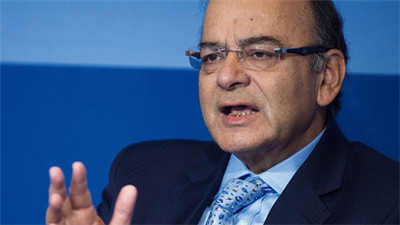(单词翻译:单击)
India is on track to overtake China with annual growth of more than 8 per cent as the government starts its second year in power by accelerating plans for economic reform and pledging to resolve tax disputes with investors, according to the country’s finance minister.
印度财长表示,印度将有望超越中国,实现8%以上的年度经济增长。他说,印度政府进入第二年任期将加快经济改革计划,并承诺解决当局与投资者之间的税务纠纷。
Rounding on critics who have complained about a lack of “big bang” reforms, Arun Jaitley said in an interview with the Financial Times that he was planning a “huge” public investment programme and the launch of “strategic” privatisations.
阿伦•亚特力(Arun Jaitley)在接受英国《金融时报》采访时,驳斥了那些抱怨印度缺乏“大爆炸式”改革的批评者。他表示,他在规划一个“巨大”的公共投资计划,并将推出“战略性”的私有化计划。

“We have restored the credibility of the decision-making process in India,” he said. “Our growth rates are much faster, our job creation is faster, our fiscal deficit is totally coming under control, our current account deficit has never been as good.”
“我们已经恢复了印度决策过程的可信度,”他说。“我们的增长速度快多了,我们的就业创造加速了,我们的财政赤字即将完全进入可控范围,我们的经常账户赤字状况空前良好。”
Prime Minister Narendra Modi and his Bharatiya Janata party won a landslide victory in last May’s general election on promises to end corruption and rejuvenate India’s sagging economy. But they have ended their first year facing a tax row with global fund managers, parliamentary delays to a land law and grumbles from business leaders disappointed by the gradualist approach to reform.
去年5月,印度总理纳伦德拉•莫迪(Narendra Modi)和他的印度人民党(Bharatiya Janata party)以终结腐败和振兴印度的疲软经济为竞选纲领,在大选中赢得压倒性胜利。但在结束第一年任期之际,本届政府面临着与全球基金管理公司的税务纠纷、土地法在议会的延误,以及商界领袖对于渐进式改革感到失望的抱怨。
Mr Jaitley, however, pledged to push a more assertive agenda during the next phase of the government’s five-year term, including a bankruptcy law to help restart private investment and a plan to pump billions of dollars into irrigation, roads and other projects to boost the country’s large rural economy.
然而,亚特力承诺在政府五年任期的下一阶段推动一项更加坚定有力的议程,其中包括破产法以帮助重启私营部门投资,以及一份向水利、道路等项目投入巨资的计划,以提振该国庞大的农村经济。
“We are looking at a bankruptcy court. We are looking at a dispute resolution mechanism in relation to public contracts. We are looking at public procurement law,” he said. “We are looking at a policy where we could perhaps eliminate a large number of prior permissions [for projects] and replace them with a regulatory mechanism.”
“我们正在研究设立一个破产法庭。我们正在研究建立一个涉及公共合同的纠纷解决机制。我们正在研究公共采购法,”他表示。“我们正在研究一项政策,或许可以取消(各类项目的)大量事先审批要求,以一个监管机制取而代之。”
Mr Jaitley added: “In the last one year, every decision we have taken points to one direction: we’ve been trying to reform and liberalise. In the next few years of this government’s term we intend to step up a huge amount of investment as far as rural infrastructure is concerned.”
亚特力补充说:“在过去一年期间,我们作出的每一个决策都指向一个方向:我们一直在努力推进改革和自由化。在本届政府任期的未来几年内,我们打算在农村基础设施方面大举加大投资力度。”
The Indian finance minister was confident that the world’s largest democracy could grow at a faster pace than China, saying “I think we can do even better” than the more than 7 per cent a year achieved by its rival and neighbour. But he added that outpacing China’s growth “doesn’t give me satisfaction” as the Chinese economy was still much larger.
印度财长相信,全球人口最多的民主国家能够在增长速度上超过中国。他表示,相比竞争对手和邻国每年7%以上的经济增长,“我认为我们可以做得更好”。但他补充说,在增速上超越中国“不能让我满意”,因为中国经济的绝对规模仍然大得多。
Mr Jaitley said the central government alone would boost infrastructure spending in this financial year by $11bn. The government has already announced a plan for $137bn of spending on the railways over the next five years.
亚特力表示,本财年仅中央政府就将增加基础设施支出110亿美元。政府已经宣布了未来五年在铁路建设上支出1370亿美元的计划。
On tax, he said “in the next few days” he would announce the scope of a committee designed to defuse a $6bn tax row with global investors and tackle a range of other “legacy” problems over retrospective tax demands that had dented the country’s reputation.
在税务问题上,他表示,他将“在接下来的几天里”宣布一个委员会的权限,该委员会旨在化解当局与全球投资者之间60亿美元的税务纠纷,并处理有关追溯性税收要求的一系列其他“遗留”问题,这些问题已经影响了印度的声誉。
Mr Jaitley, despite opposition from the Congress party in the upper house of parliament, said he was determined to stick to his target for introducing a long-delayed nationwide goods and services tax, which would replace a plethora of state fees and taxes and transform India’s 29 states into a single market as well as proving the government’s commitment to economic reform.
尽管在议会上院遭遇国大党(Congress party)反对,但亚特力表示,他决心坚持自己的目标,出台拖延已久的全国范围的商品及服务税,该税种将取代繁多的各邦税费,使印度29个邦变成一个单一市场,同时证明政府的经济改革决心。
“I want to beat the deadline of 1st April 2016,” he said. “I’m conscious of the fact that it’s cutting [it] fine. But yet I want to make a huge effort.”
“我想赶在2016年4月1日的最后期限之前,”他说。“我意识到时间很紧的事实。但我还是想付出巨大努力。”
Mr Jaitley said he had no plans “at the moment” to fully privatise big state-controlled banks and energy companies, but he would launch a “strategic disinvestment” programme this year to sell lossmaking public businesses such as government-owned hotel groups.
亚特力表示,他“眼下”没有计划完全私有化大型国有控股的银行和能源公司,但他将在今年发起“战略撤资”计划,出售亏损的公共企业,如政府拥有的酒店集团。
He added that Mr Modi’s administration had tackled corruption and that people no longer lined up “for favours” in government offices in New Delhi.
他补充说,莫迪政府已经对腐败采取了行动,在新德里的政府部门,不再有人排队请求“关照”。
The sum total of incremental reforms was “significant”, Mr Jaitley said. “We think compared to most countries we are doing much better, and if you continue to accelerate our reforms and are able to bring in more capital into India, this is a real chance for us.”
亚特力表示,这些小步改革的总量是“显著的”。“我们认为,与多数国家相比,我们做的好得多。只要继续加快我们的改革,并能够吸引更多资本进入印度,这将是我们的一个真正机会。”


